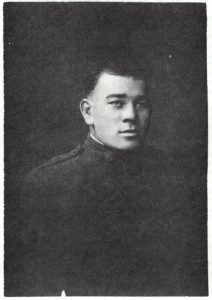“Except for the rumbling of heavy shells high overhead and the occasional swoosh of a magnesium flare as they slowly parachute down over no man’s land bathing it in an eerie glow, it has been a comparatively quiet night.”
Quiren M. Groessl, a German-American from Algoma, Wisconsin, described the early morning of May 28, 1918. Groessl had lied about his age to enlist in the U.S. Army, then served as a corporal in the 5th Wisconsin Regiment at the Western Front after the United States entered World War I.
The relative calm of that May morning soon vanished, and the day turned out to be a horrific one for Groessl. The German artillery bombardment turned more fierce, killing the other soldiers in his trench. Seeming to appear from nowhere, German soldiers captured him in the trench and began marching him across No Man’s Land toward the German lines.
When he attempted to escape, Groessl was bayoneted in the back by one of his three captors. Wounded and angry, Groessl managed to kill two of the Germans. The third German readied to bayonet Groessl yet again but suddenly fell dead — apparently killed by an artillery explosion.
Free of his captors but unable to stand because of his wounds, Groessl during the course of the next several hours rolled over repeatedly, hoping he was headed in the right direction, toward the American lines.
“I managed to get to a sitting position, but how I managed to get to my feet with the use of my arms is something I am unable to explain,” he later wrote. “Staggering drunkenly, my head hanging down and my arms hanging helplessly at my sides, I fell to the ground trying to cross the parapet in front of our trench.”
“Even before I could cry out for help, the lookouts in our trench had alerted the others who laid down a covering fire. Two of our boys crawled partially out of the trench, grabbed me by the blouse and pulled me in into the trench.”
Groessl spent several months in hospitals, first in France then back in the United States, recovering from his wounds. In September 1918 he was recruited to give speeches for the Liberty Bonds campaign, raising money for the war effort. He was discharged from the Army in January 1919.
In September 1927, revisiting the scene in France of his dramatic capture by the Germans, Groessl narrowly escaped being wounded yet again. Walking along a field where the trenches had been, Groessl and his brother Joe avoided, by seconds, the detonation by French demolition engineers of ordnance left over from the war.
“Talk about a ‘big moment.’ This was it, nearly getting killed on almost the exact spot where I had been wounded ten years before,” he wrote.
Groessl recounted his war-time experiences in a vivid memoir, Big Boy: A Diary of World War I, which he wrote in 1966 at the age of seventy. It is available at the Veterans History Project of the Library of Congress.

